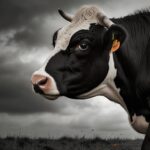Denmark is set to implement a pioneering carbon tax on agriculture, becoming the first country worldwide to do so. The tax will target greenhouse gas emissions from livestock and is expected to have significant environmental and economic implications for the industry.
Denmark is poised to introduce a groundbreaking carbon tax on agriculture, marking the first legislation of its kind worldwide. The tax is set to take effect after the Danish parliament’s anticipated approval in August. This decision follows protracted negotiations involving the government, farmer organizations, trade unions, industry representatives, and environmental NGOs.
The tax scheme, confirmed on Monday, will impose a charge of 120 kroner (£14) per ton of greenhouse gas emissions from livestock by 2030, with an increase to 300 kroner per ton by 2035. The collected revenues will be allocated to a fund supporting the green transition of the livestock industry for at least two years post-implementation.
Agriculture, responsible for approximately one-third of global greenhouse gas emissions—half of which are from livestock—has been a focal point for environmental advocates. The Danish initiative is expected to reduce CO2 emissions by 1.8 million tons by 2030 and includes a 40 billion kroner fund aimed at protecting nature, restoring degraded ecosystems, and creating forests and wetlands.
Despite previous global attempts, including New Zealand’s recently scrapped plans to tax agricultural emissions, Denmark’s move is seen as a significant step. Finance Minister Nicolai Wammen highlighted this as an investment in the future of agriculture, aligning with a broader societal cost-effective model for CO2 taxation.
Denmark, a key producer of pork, beef, and milk, aims to set a precedent for cleaner farming practices through this tax. Prof Mark Howden from the Australian National University emphasized the importance of addressing emissions from the agri-food sector and noted that financial incentives could accelerate the implementation of existing solutions.





